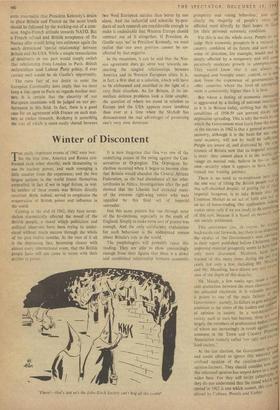Winter of Discontent
Ttie really important events of 1962 were two: for the first time, America and Russia con- fronted each other directly, each threatening to use its nuclear power, and each emerging a little steadier from the experience; and the two largest nations in the world found themselves embroiled, in fact if not in legal fiction, in war. In neither of these events was Britain directly involved. Both, indeed, served to emphasise the evaporation of British power and influence in the world.
Coming at the end of 1962, they have never- theless dramatically affected the mood of the British people, a mood which politicians and political observers have been trying to under- stand without much success through the whole of the past twelve months. At the root of it all is the depressing fact, becoming clearer with almost every international event, that the British people have still not come to terms with their decline in pinker.
It is now forgotten that this was one of the underlying causes of the swing against the Con- servatives at Orpington. The Orpington by- election occurred when it began to become clear that Britain would abandon the Central African Federation, as she had abandoned all her other territories in Africa. Investigations after the poll showed that the Liberals had attracted many of the extreme right-wing voters who were appalled by this final act of imperial surrender.
Just this same pattern has run through most of the by-elections, especially in the south of England. Simply to make some sort of protest was enough. And the only satisfactory explanation for such behaviour is the widespread unease about Britain's role in the world.
The psephologisis will probably reject this reading. They arc able to show convincingly enough from their figures that there is a direct and established relationship between economic
'There!—that's just so's the John Birch Society can't hog all the crediL'
prosperity and voting behaviour; and gill clearly the majority of people's votes a affected most directly by their hopes or fee for their personal economic condition.
Yet this is not the whole story. People do nal judge their economic prospects in a vacuum. country confident of its future and sure of sense of direction, for example, would not deeply affected by a temporary and still co paratively moderate growth in unemploy.aneni, They would k now that it can always he, managed and brought under control, as is e1f0 dent from the experience of governments :i11 other countries where the level of unemploy ment is consistently higher than it is here.
But where a feeling of economic in cu is aggrakated by a feeling of national insecuritr!.' as it is in Britain today, nothing but the bourn conditions of 1958-59 can prevent doubt arr depression spreading. This is why the main less° which the Government must learn from the me of the electors in 1962 is that a general economi recovery, although it is the basis for any dee toral recovery, will not by itself be sufficient People are aware of, and distressed by, the ai lessneSs of Britain now that its imperial m1- is over: they cannot place it in the world..en..! visage its natural role, believe in its— or their own—security when it appears to have neith'er. trusted nor trusting partners. There is no need to re-emphasise here OA the one way of lifting the British people out this self-absorbed despair, of getting rid of thcif imperial hangover, is to take Britain into Common Market as an act of faith and nO* an act of horse-trading. Our application, inde.e makes sense only if we are ready to do sernell, of this sort, because it is based on necessitY :01 nOt merely preference. This contention can, of course, be arg040 backwards and forwards, but there is no disPutil the verdict of the Government's own advisti in their report published before Christmas, rn:d. improved material prosperity seems to have bred improved more discontent. Ministers hare htiye warned of this many times during the last-1CO3
A
years, but only a few, including Mr. N'4 3` and Mr. Maudling, have shown any real 3"ra ness of the depth of this disquiet.
Va
M. Maude, a few weeks ago, made able distinction between the mass electorate ar'se the educated electorate. It is valuable hc,c: tbe it points to one of the main failures 01 late Government : namely, its failure to give adeclitela attention ta the views of the leaders and ereahic.31 of opinion in society. In a non-hieraPiverv society such as ours has become, these arc 1,01y largely the members of professional bodies' °what of whom are increasingly in revolt against ri:og someone in the Town and Country plc Association recently called .'our ugly and Uri' used society.' red At the last election, the Ciovernment ign° and could afford to ignore this educated ar13
and
civilised opinion of the opinion-carriers. tiat
opinion-formers. '[hey should consider now in no
this informed opinion has seeped down to 3 wider base. For they will invite catastropheba/g they do not understand that the mood which be spread in 1962 is one which cannot, this altered byby Colman. Prentis and Varley.






























 Previous page
Previous page